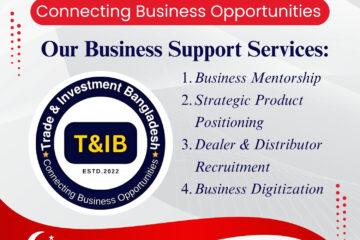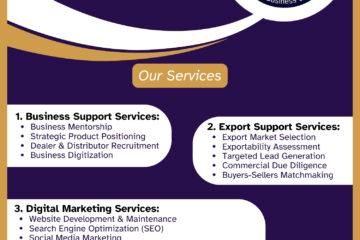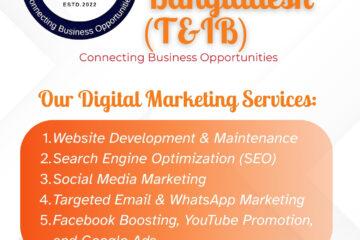Connecting Buyers and Sellers for Perfect Matches
Md. Joynal Abdin*
Business Consultant & Digital Marketer
Co-Founder & CEO of Trade & Investment Bangladesh
In various markets, the connection between buyers and sellers is pivotal for the functioning and growth of the economy. This interaction forms the backbone of commerce, enabling the exchange of goods, services, and ideas. When buyers and sellers are effectively connected, it creates a vibrant marketplace where supply meets demand, fostering competition, innovation, and economic development. In essence, the interconnectedness of buyers and sellers is fundamental to sustaining a healthy and thriving business ecosystem.
- Role of Effective Matchmaking in Business Transactions:
Effective matchmaking plays a crucial role in streamlining and enhancing business transactions between buyers and sellers. In the absence of efficient matchmaking, businesses face challenges such as information asymmetry, difficulty in finding suitable partners, and a lack of trust. Matchmaking platforms leverage technology and data analytics to connect buyers with sellers whose offerings align with their needs. This not only simplifies the process of identifying potential partners but also contributes to the overall efficiency and success of business transactions.
- Key Components and Benefits of a Buyers-Sellers Matchmaking Platform:
- User Profiles and Preferences: User profiles act as a digital representation of both buyers and sellers, outlining their preferences, offerings, and business characteristics. The matchmaking platform utilizes this data to identify compatible matches, ensuring a more targeted and relevant connection.
- Advanced Algorithms: Sophisticated algorithms are employed to analyze large datasets, considering factors such as product specifications, pricing, location, and historical transaction data. These algorithms enhance the accuracy of matching, facilitating connections that are more likely to result in successful business transactions.
- Customization and Flexibility: Buyers-sellers matchmaking platforms often offer customization options to accommodate the diverse needs of businesses across various industries. Customization ensures that the matchmaking process aligns with the unique requirements and preferences of different users, contributing to more personalized and effective connections.
- Trust-building Mechanisms: Establishing trust is paramount in business transactions. Matchmaking platforms implement mechanisms such as user ratings, reviews, and verified profiles to build trust among users. These features contribute to a transparent and reliable environment, encouraging buyers and sellers to engage in transactions with confidence.
- Streamlined Communication: Effective communication is facilitated through the platform, allowing buyers and sellers to interact, negotiate, and finalize transactions. Streamlining communication within the platform enhances efficiency, reduces response times, and contributes to the overall success of business interactions.
- Benefits:
- Time Efficiency: Saves time for both buyers and sellers by presenting pre-qualified and relevant matches.
- Increased Success Rates: Facilitates connections based on compatibility, increasing the likelihood of successful transactions. Market Expansion: Opens up opportunities for businesses to explore new markets and clientele.
- Cost-effectiveness: Reduces the costs associated with traditional search methods and marketing efforts.
The Changing Landscape:
Modern markets have undergone a significant transformation due to advancements in technology. The advent of the internet, digital platforms, and data analytics has revolutionized buyer-seller interactions. Technology has facilitated seamless connectivity, real-time communication, and data-driven decision-making, reshaping the way businesses operate and engage with their customers.
- Digitalization of Commerce: E-commerce platforms have become ubiquitous, allowing buyers to access a global marketplace from the comfort of their homes. Sellers can showcase their products or services online, reaching a broader audience beyond traditional geographical constraints.
- Data Analytics and Personalization: Technology enables the collection and analysis of vast amounts of consumer data. Sellers can use this data to personalize their offerings, target specific customer segments, and tailor marketing strategies.
- Mobile Connectivity: Mobile technology has empowered consumers to browse, compare prices, and make purchases on the go. Sellers leverage mobile apps and responsive websites to provide a seamless and convenient shopping experience.
- Emergence of AI and Machine Learning: AI algorithms and machine learning models enhance product recommendations, search functionalities, and predictive analytics. Chatbots powered by AI facilitate instant customer support, improving the overall buyer experience.
Challenges Faced Without Efficient Matchmaking Solutions:
- Information Overload: In a digital era with an abundance of choices, buyers can be overwhelmed by the sheer volume of information available. Sellers may struggle to stand out and reach their target audience effectively.
- Trust Issues: Without a reliable matchmaking system, buyers and sellers may face challenges in establishing trust. Concerns about fraud, misrepresentation, or the quality of products can hinder transactions.
- Inefficient Resource Utilization: Buyers and sellers may spend significant time and resources searching for suitable partners without efficient matchmaking solutions. This inefficiency can lead to missed opportunities and increased operational costs.
- Limited Market Visibility: Businesses may struggle to expand their reach and enter new markets without a platform that connects them to potential partners. Lack of visibility can hinder growth and limit opportunities for collaboration.
Impact of Effective Matchmaking in Various Industries:
- Real Estate: Online real estate platforms connect property buyers with sellers, streamlining the property search process. Matchmaking solutions in real estate provide a centralized platform for property listings, enhancing visibility and accessibility.
- Freelance Services: Platforms connecting freelancers with clients have transformed the gig economy. Efficient matchmaking allows businesses to find freelancers with specific skills, and vice versa, fostering successful collaborations.
- B2B Marketplaces: Business-to-business (B2B) matchmaking platforms facilitate connections between suppliers and buyers. These platforms optimize supply chain processes, reduce procurement costs, and enhance business partnerships.
- Job Recruitment: Online job platforms use matchmaking algorithms to connect employers with suitable candidates. This technology streamlines the hiring process, reducing time-to-fill positions and ensuring better candidate-employer fit.
Technological Tools and Platforms for Buyers-Sellers Matchmaking:
- Online Marketplaces: Platforms like Amazon, eBay, and Alibaba serve as extensive marketplaces, connecting buyers with sellers globally. These marketplaces provide a user-friendly interface, search functionalities, and secure transaction mechanisms.
- B2B Matchmaking Platforms: Platforms like ThomasNet and Alibaba’s B2B platform focus specifically on connecting businesses for wholesale transactions. They often incorporate features such as product categorization, supplier verification, and communication tools.
- Real Estate Portals: Websites like Zillow and Realtor.com connect property buyers with sellers and real estate agents. These platforms often integrate map-based search functionalities, property details, and communication tools.
- Freelance and Job Platforms: Websites like Upwork, Fiverr, and LinkedIn connect freelancers and job seekers with businesses looking for services or talent. Matchmaking is facilitated through skill-based algorithms, project details, and client feedback.
Integration of AI, Machine Learning, and Data Analytics:
- AI-Powered Recommendations: AI algorithms analyze user behavior, preferences, and historical data to provide personalized recommendations. For example, Amazon’s recommendation engine suggests products based on past purchases and browsing history.
- Predictive Analytics for Matchmaking: Predictive analytics models forecast future buyer-seller matches based on historical data. B2B platforms may use predictive analytics to identify potential business partners with compatible needs.
- Chatbots for Customer Interaction: AI-driven chatbots handle customer inquiries, provide assistance, and streamline communication between buyers and sellers. These chatbots enhance user experience and facilitate real-time interaction.
- Machine Learning in Fraud Detection: Machine learning models analyze transaction patterns to detect and prevent fraudulent activities. This technology ensures the security and integrity of the matchmaking platform.
Success Stories of Businesses Leveraging Technology:
- Amazon: Amazon’s use of AI and machine learning in its recommendation engine has significantly contributed to its success. The platform’s ability to suggest relevant products based on user behavior has led to increased customer satisfaction and higher sales.
- Alibaba: Alibaba’s B2B platform utilizes AI algorithms for supplier verification, product recommendations, and personalized user experiences. This technology has played a key role in connecting businesses globally and facilitating successful transactions.
- Upwork: Upwork’s matchmaking platform uses AI to match freelancers with suitable projects. The platform’s success is evident in its ability to efficiently connect businesses with freelancers, enabling seamless collaboration.
- Zillow: Zillow’s real estate platform incorporates AI for property recommendations and predictive analytics for market trends. This technology has contributed to Zillow’s success in connecting home buyers and sellers in a dynamic real estate market.
- LinkedIn: LinkedIn leverages machine learning algorithms for job recommendations, skill endorsements, and connection suggestions. The platform’s success is rooted in its ability to facilitate professional networking and career connections.
Key Features of Effective Matchmaking:
Essential Features of Effective Buyers-Sellers Matchmaking Platforms:
User Profiles:
Importance: Detailed user profiles provide a comprehensive overview of buyers and sellers, including preferences, offerings, and transaction history.
Benefits: Facilitates accurate matchmaking, establishes transparency, and allows users to make informed decisions.
Example: LinkedIn uses user profiles to connect professionals based on skills, industries, and networking objectives.
Advanced Algorithms:
Importance: Algorithms process vast amounts of data to identify patterns, preferences, and potential matches.
Benefits: Enhances matchmaking accuracy, improves the relevance of suggested connections, and optimizes the overall user experience.
Example: Netflix employs sophisticated algorithms to recommend movies and TV shows based on user viewing history and preferences.
Customization and Flexibility:
Importance: Customization features allow users to define specific criteria and preferences for potential matches.
Benefits: Increases user satisfaction, tailors the matchmaking process to individual needs, and accommodates diverse requirements across different industries.
Example: Airbnb allows users to customize their search based on criteria such as location, property type, and amenities, ensuring personalized matches.
Trust-building Mechanisms:
Importance: Establishing trust is crucial in buyer-seller interactions. Trust-building mechanisms include user reviews, ratings, and verified profiles.
Benefits: Boosts confidence in the platform, reduces the risk of fraudulent transactions, and encourages users to engage in successful transactions.
Example: eBay relies on buyer and seller ratings, providing a transparent feedback system that enhances trust among users.
Streamlined Communication:
Importance: Efficient communication tools within the platform facilitate interaction between buyers and sellers.
Benefits: Accelerates decision-making, negotiation, and transaction processes, contributing to successful connections.
Example: Slack, a team collaboration platform, streamlines communication for businesses, allowing for real-time messaging, file sharing, and collaboration.
Industry-Specific Matchmaking:
Real Estate:
Challenges: Real estate matchmaking involves complex considerations, including location preferences, property types, and budget constraints.
Opportunities: Industry-specific platforms allow users to filter properties based on specific criteria, such as size, amenities, and proximity to essential services.
B2B Markets:
Challenges: Business-to-business matchmaking requires understanding complex supply chain dynamics, industry compliance, and regulatory requirements.
Opportunities: Platforms in this sector often provide features such as supplier verification, industry-specific categorization, and customizable searches to facilitate precise matches.
Freelance and Gig Economy:
Challenges: Matching freelancers with suitable projects involves considering skill sets, project requirements, and budget constraints.
Opportunities: Specialized platforms allow freelancers to showcase their skills, enabling businesses to find talent based on specific project needs.
Job Recruitment:
Challenges: Job matchmaking requires aligning candidate qualifications, skills, and career goals with employer requirements.
Opportunities: Platforms often leverage AI for skill-based matching, personalized job recommendations, and streamlined communication between employers and candidates.
E-commerce:
Challenges: E-commerce matchmaking involves understanding buyer preferences, product specifications, and market trends.
Opportunities: Advanced algorithms on e-commerce platforms analyze user behavior, recommend products, and personalize the shopping experience to enhance buyer-seller connections.
Manufacturing and Supply Chain:
Challenges: Connecting manufacturers with suppliers involves considerations like production capacity, quality standards, and delivery timelines.
Opportunities: Industry-specific platforms streamline procurement processes, provide supplier ratings, and facilitate communication to strengthen supply chain connections.
To read 2nd part of this article, click here!
Connecting Buyers and Sellers for Perfect Matches
Mr. Md. Joynal Abdin is a Business Consultant & Digital Marketer based in Dhaka, Bangladesh. He is Founder & CEO, Trade & Investment Bangladesh and Co-Founder & CEO of Bangladesh Trade Center. Previously he served at Dhaka Chamber of Commerce & Industry (DCCI) as Executive Secretary; DCCI Business Institute (DBI) as Executive Director; SME Foundation as Deputy Manager; and the Federation of Bangladesh Chambers of Commerce & Industry (FBCCI) as Assistant Secretary.
The list of services Mr. Abdin is offering includes but not limited to Business Mentorship, Business Research and Documentations, Export Market Selection and Product Positioning at Home and Abroad; Buyers-Sellers Matchmaking; Website Development; Search Engine Optimization (SEO); and Social Media Marketing etc.






0 Comments